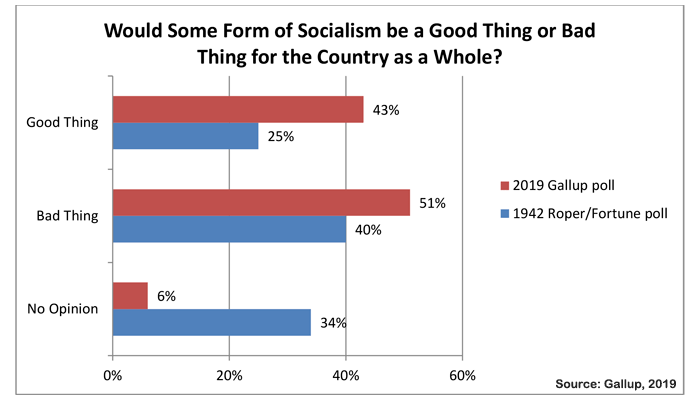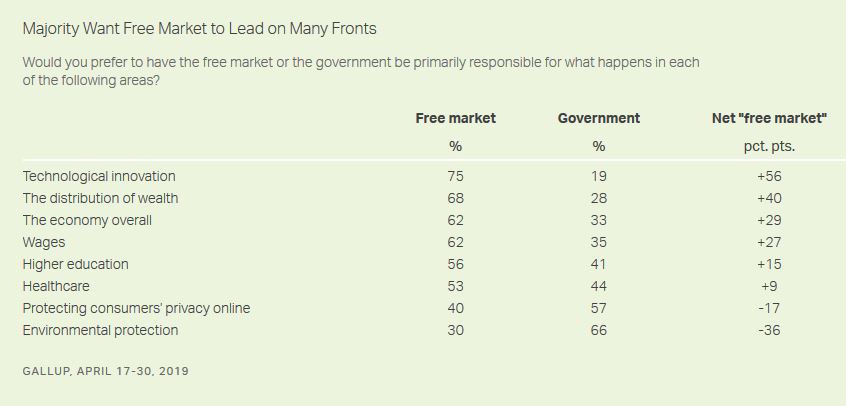by Lil Tuttle
“Four in 10 Americans Embrace Some Form of Socialism,” announced the headline by Gallup Polling on May 20. Gallup’s survey, conducted in April, produces a confused picture of Americans’ attitudes about socialism and capitalism. Despite some receptivity to socialism (and perhaps to a socialist president, according to an earlier Gallup poll), a majority of Americans still want the capitalism’s free-market – not socialism’s government bureaucracy – to be the driver of most aspects of their economic and social life.
1942 vs 2019
The left in America has been flirting with socialism for nearly a century. In 1942, when Americans were asked if socialism would be a good or bad thing for the country, 34 percent of respondents had no opinion, 25 percent thought socialism would be a good thing, and 40 percent thought a bad thing.
By 2019, only 6 percent had no opinion, 43 percent though socialism a good thing, and 51 percent considered it a bad thing.

A “Good Thing” for What?
In perhaps the most interesting question of the poll, Gallup also asked Americans “whether they would prefer mostly free market or government control over several economic and societal activities” affecting their lives. The answers are enlightening.
A majority of respondents preferred the capitalist free-market system to stay in the driver’s seat for technological innovation (75%), the distribution of wealth (68%), the economy overall (62%), wages (62%), higher education (56%), and healthcare (53%).

Government control was preferred in only two areas: protecting consumers’ privacy online, and environmental protection.
The left’s escalating environmental crisis hysteria likely contributes to respondents’ preference for government control in the area of environmental protection. Yet our environment is actually doing quite well, argues Nicolas Loris of The Heritage Foundation:
In the United States, the common perception is that the country’s environmental state is deteriorating. On the contrary, through investment in new technologies, and through legislation, environmental trends have improved significantly in the United States. Pollutants known to cause harm to public health and the environment are declining. According to the Environmental Protection Agency’s latest air quality trends report, the combined emissions of the six common air pollutants have decreased 73 percent between 1970-2017” [emphasis added].
Socialism: a “Real Danger”
Last week, the Fox Business News channel devoted time in several of its shows to the capitalism vs. socialism discussion. In a Maria Bartiromo show segment (3 min), Why socialism is a real danger, Mark Penn, pollster and chief strategist for the Hillary 2008 campaign, points out:
In the polls I’ve been doing—Harvard-Harris polls—you ask America socialism or capitalism, 65 percent say capitalism. But among 18 to 29, a majority say socialism. This is a real problem. They have a different lifestyle where they go from college to roommates, and they don’t have full responsibility for 10 or 12 years; and they are falling prey to socialist rhetoric. It’s a real danger.
No Debate: Capitalism beats Socialism
FBN’s Charles Payne held an hour-long Town Hall debate on socialism, which can be viewed in its entirety in four 15-minute segments here, here, here, and here. Reviewing that Town Hall debate, Alexander Markovsky of the London Center for Policy Research writes,
Without offering a clear definition and ideological purpose of socialism by either side, the discussion had centered on warts and blemishes of a capitalist system. Fixated on the single idea that capitalism is inherently flawed, the socialists advocated its replacement with a government controlled social organization that would presumably ensure universal justice and equality with a plethora of lavish social programs. Although the socialists could not explain how the fulfillment of the egalitarian dreams would be implemented and at what cost, the socialist dreams showed no bounds.
One debate participant pointed to China “as an example of successful socialism.” Another suggested “the Scandinavian model.”
Noting Denmark has a total population equal to the U.S. city of Houston TX, Markovsky argues that the notion that “something similar to the Scandinavian social organization could be implemented in this country flouts strategic and historical realities.”
Despite the host of economic and political challenges no informed and intelligent observer can deny America’s extraordinary accomplishments in the areas of quality of life, economy, politics and social development.
I used to tell my students that if they cannot express themselves in numbers, they do not know what they are talking about. Here are some numbers that signify America’s greatness [i.e., its achievement under a capitalist system].
Just over 100 years ago, in 1913, in the United States:
The average life expectancy for men was 47 years.
Only 14 percent of homes had a bathtub.
Only 8 percent of homes had a telephone.
Only 6 percent of all Americans had graduated from high school.
There were only 8,000 cars and 144 miles of paved roads.
A three-minute call from Denver to New York City cost 11 dollars, while the average was in the U.S. was 22 cents per hour.
The capitalist free-market experience throughout history is one of increased personal freedom, wealth creation, plentiful goods and services, voluntary cooperation, and individual empowerment. The socialist government experience throughout history is one of increased personal dependence, poverty, scarcity, coercion, and powerlessness. Venezuela is only the latest example in the history of socialist experimentation.
No wonder Americans still prefer the free-market.
